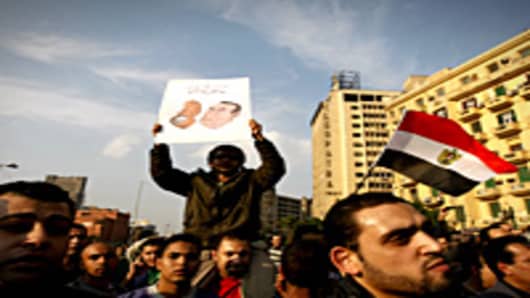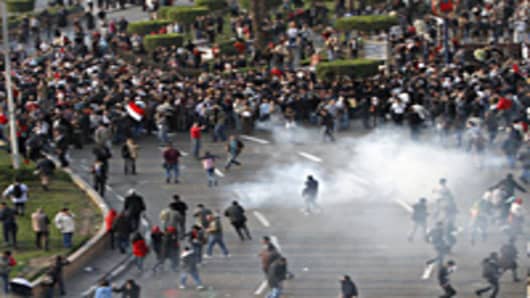The White House says anti-government protests in Egypt are an opportunity for President Hosni Mubarak to demonstrate his willingness to listen to his citizens and make "necessary" political reform.
Obama spokesman Robert Gibbs says the U.S. believes the Egyptian government is stable. He called on all parties to refrain from violence.
Tens of thousands of people have filled the streets of Cairo and elsewhere in the country in the largest anti-government protests in years. Demonstrators are calling for Mubarak's ouster after 30 years in power.
The protests effected the country's markets as Egypt's benchmark index recorded its biggest drop in over two years Thursday, plummeting more than 10 percent as anti-government protests rattled investor confidence.
The EGX30 index closed down 10.5 percent to 5,646.50 points, capping a two day slide that brought its year-to-date losses to almost 21 percent.
The market had tumbled 6.25 percent just 15 minutes into the session before trading was temporarily suspended. But the pause seemed to cement investor fears, and the drop continuing with the market's resumption.
Violence escalated in two cites outside the capital Cairo Thursday where anti-government protesters torched a fire station and looted weapons that they then turned on police. Egypt's top democracy advocate returned to the country and declared he was ready to lead the campaign to oust longtime President Hosni Mubarak.
In the flashpoint city of Suez, east of Cairo, witnesses said rioters—some wearing surgical masks to ward off tear gas—firebombed the main fire station and firefighters jumped out windows to escape the flames, as heavy black smoke billowed from the building.
In the northern Sinai area of Sheik Zuweid, several hundred Bedouins and police exchanged live gunfire, killing a 17-year-old man. About 300 protesters surrounded a police station from rooftops of nearby buildings and fired two RPGs at it, damaging the walls.
Social networking sites were abuzz with talk that Friday's rallies could be some of the biggest so far calling for the ouster of Mubarak after 30 years in power. Millions gather at mosques across the city for Friday prayers, providing organizers with a huge number of people already out on the streets to tap into.
By Thursday evening, Facebook, Twitter and Blackberry Messenger services were interrupted, possibly a move by authorities to hamper protesters from organizing.
Egypt's ruling party said it was ready for a dialogue with the public but offered no concessions to address demands for a solution to rampant poverty and political change heard in the country's largest anti-government protests in years. Safwat El-Sherif, the secretary general of the National Democratic Party and a longtime confidant of Mubarak, was dismissive of the protesters at the first news conference by a senior ruling party figure since the protests began.
"We are confident of our ability to listen. The NDP is ready for a dialogue with the public, youth and legal parties," he said. "But democracy has its rules and process. The minority does not force its will on the majority."
The 82-year-old Mubarak has not been seen in public or heard from since the protests began Tuesday with tens of thousands marching in Cairo and a string of other cities.
Mubarak has not said yet whether he will stand for another six-year term as president in elections this year. He has never appointed a deputy and is thought to be grooming his son Gamal to succeed him despite popular opposition. According to leaked U.S. memos, hereditary succession also does not meet with the approval of the powerful military.
Mubarak has seen to it that no viable alternative to him has been allowed to emerge. Constitutional amendments adopted in 2005 by the NDP-dominated parliament has made it virtually impossible for independents like ElBaradei to run for president.
Mubarak's administration suffered another serious blow Thursday when the stock market crashed. The benchmark index fell more than 10 percent by close, its biggest drop in more two years on the back of a 6 percent fall a day earlier.
The protesters have already achieved a major feat by sustaining their demonstrations for three days in the face of a brutal police crackdown. Seven people have been killed, hundreds hurt and nearly 1,000 detained.
The government has banned all gatherings and police have fired rubber bullets, tear gas, and used water cannons to disperse crowds.
They have also fired live ammunition in the air at time to warn people and there have been many scenes of riot police in helmets and shields charging crowds and beating people with batons and plainclothes police beating demonstrators with long sticks.
Some of the worst unrest Thursday was in the hot spot of Suez. The protesters also stoned lines of helmeted riot police with shields, who fired back with rubber bullets, water cannons and tear gas. Debris and rocks littered the streets.
Demonstrators ran through white clouds of tear gas and kicked the canisters back at police. Some shielded themselves with overturned metal dumpsters and hurled rocks from behind the makeshift barricades. Police said 30 people were injured in the melee.
There was also looting in the city, and protesters broke an ATM and stole the cash.
In the Suez Canal city of Ismailia, east of Cairo, hundreds of protesters clashed with police who used tear gas and batons to disperse them.
Associated Press reporters saw scores of protesters outside the downtown Cairo offices of Egypt's lawyers' union, which has been one of the flashpoints of this week's unrest. Facebook, Twitter and Blackberry Messenger services have been interrupted, possibly a move by authorities to hamper protesters from organizing.
Egypt's ruling party says it is ready for a dialogue with the public but offered no concessions to address demands for political change.
Besides Egypt, other governments in the area are seeing local uprisings.
Yemeni protesters inspired by unrest in Tunisia, Egypt and elsewhere are demanding an end to President Ali Abdullah Saleh's long rule, but peaceful change looks unlikely in a tribal land mired in conflict and poverty.
"People are upset. They want Saleh to leave. He's been in power for 33 years and has destroyed the country," said Abdullah al-Faqih, a political science professor at Sanaa University.
At least 16,000 demonstrators took to the streets in Sanaa on Thursday in the biggest of a wave of anti-government protests this month, echoing the Arab ferment touched off by the popular overthrow of Tunisian President Zine al-Abidine Ben Ali.
"The Yemeni socio-political context is fiercely tribal," said Khaled Fattah, an expert on Yemen and state-tribe relations in the Arab world at Scotland's St Andrews University.
"The keys to any major political change in Yemen are not in the hands of unions and political parties, but influential tribal leaders and members of the Saudi royal family."
Neighbouring Saudi Arabia, worried by instability in Yemen where an al Qaeda network has taken root, helps bankroll Saleh, but also maintains independent ties with some Yemeni tribes.
Yemen is in far worse economic shape than Tunisia or Egypt, but popular grievances in all three nations focus on high prices and unemployment, along with high-level corruption and misrule.
Unemployment in Yemen is in the 35 percent range, according to Yemeni political analyst Abdul-Ghani al-Iryani, citing what he said were conservative government estimates. One third of Yemen's 23 million people now live below an absolute poverty line defined as access to 1,200 calories per day, he added.
Tunisia's foreign minister announced his resignation Thursday, state media reported, as authorities sought to quell unrest by street protesters who want to oust other cronies of deposed former President Zine El Abidine Ben Ali.
The TAP news agency announcement about Foreign Minister Kamel Morjane came as the prime minister was expected to reveal the makeup of Tunisia's second interim government since Ben Ali fled the North African country on Jan. 14 after weeks of protests.
Secular Tunisia, with its relative wealth, educated middle class and absence of regional or religious cleavages, offers many contrasts to Yemen, a deeply Muslim society riven by southern separatism and a recent war with northern rebels.



